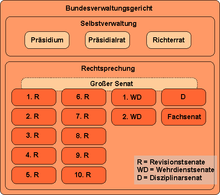Great Senate
In Germany, the Grand Senates are special judging bodies at the highest federal courts (cf. Art. 95 GG), which were set up to ensure the uniformity of the jurisdiction of the respective federal court.
Great Senates
All federal courts have a grand senate ; At the Federal Court of Justice there is, in deviation from this, a large senate for civil matters and a large senate for criminal matters due to the dual competence of the BGH on the one hand in civil matters and on the other in criminal matters.
The major senates usually consist of the president of the respective federal court, who presides by law, as well as a member of each senate, sometimes there are further members.
If a Senate wants to answer a legal question differently than another Senate did in an earlier decision (and the other Senate remains with its original decision on request), it submits the legal question to the Grand Senate, which then addresses the problem for this individual case binding decisions. This procedure must also be followed if a Senate wishes to deviate from the case law of the Grand Senate.
- Legal bases
- Federal Labor Court (BAG): Section 45 of the Labor Court Act (ArbGG)
- Federal Fiscal Court (BFH): Section 11 of the Financial Court Regulations (FGO)
- Federal Court of Justice (BGH) [in civil matters: Section 132 of the Courts Constitution Act (GVG); in criminal matters: § 132 GVG]
- Federal Social Court (BSG): Section 41 of the Social Court Act ( SGG).
- Federal Administrative Court (BVerwG): Section 11 of the Administrative Court Code (VwGO)
United Great Senates
If legal questions are answered differently between the civil and criminal senates of the Federal Court of Justice, the question should be submitted to the United Grand Senates ( § 132 GVG ). A legal question judged differently between civil panels of the Federal Court of Justice, however, would not be submitted to the United Grand Senates, but to the Grand Senate for Civil Matters. The same applies to deviations within the criminal senate: These are decided by the Grand Senate for criminal matters.
Joint Senate of the highest federal courts
In order to avoid discrepancies in the case law between the various federal courts, a joint senate of the highest federal courts was formed in accordance with Article 95, Paragraph 3 of the Basic Law (GG) .
See also
Web links
- Information on the Grand Senates and the United Grand Senates on the Federal Court of Justice website
